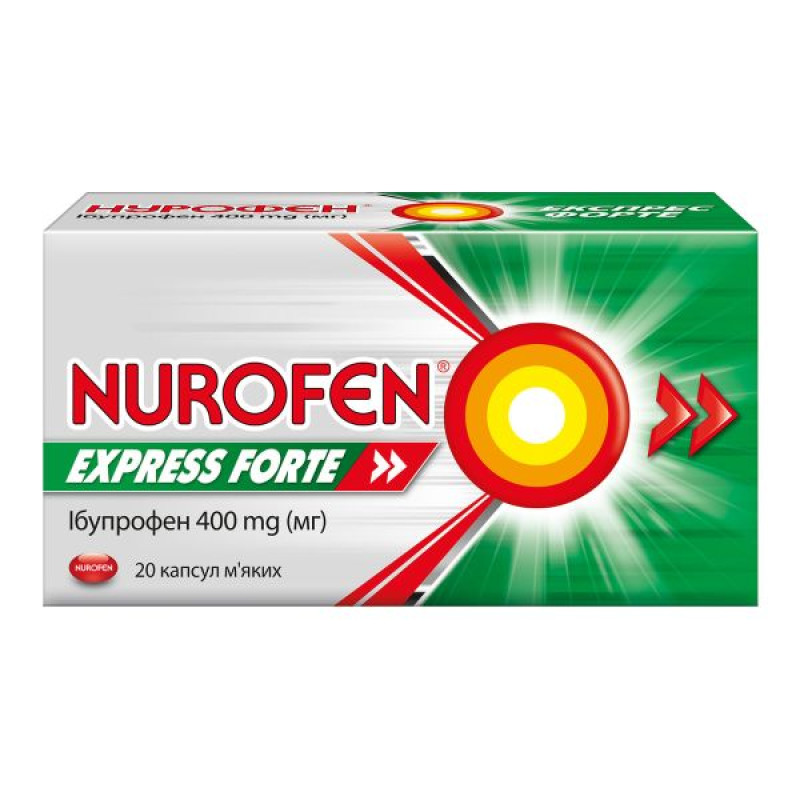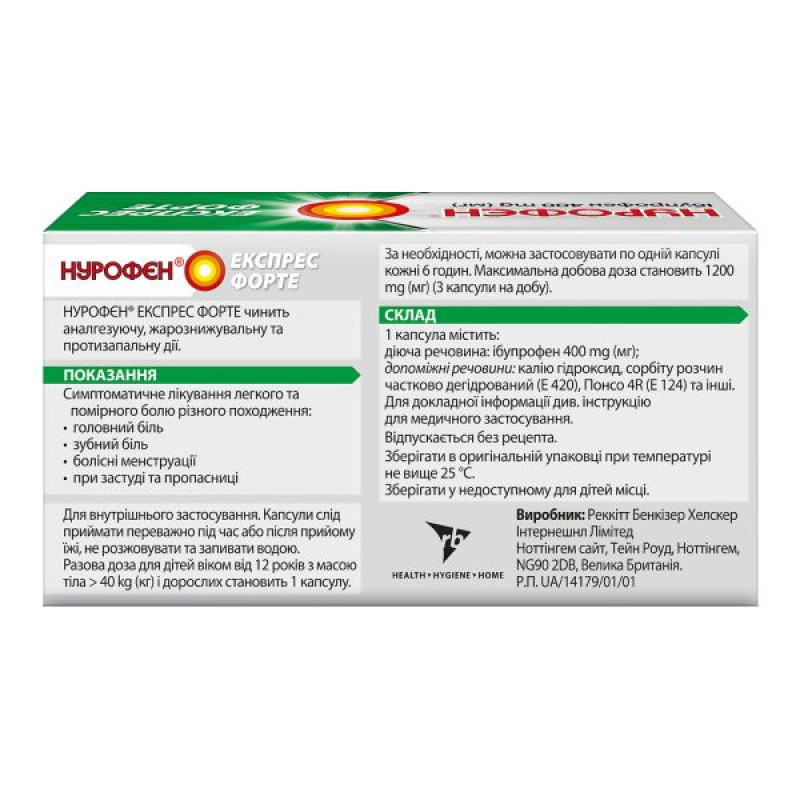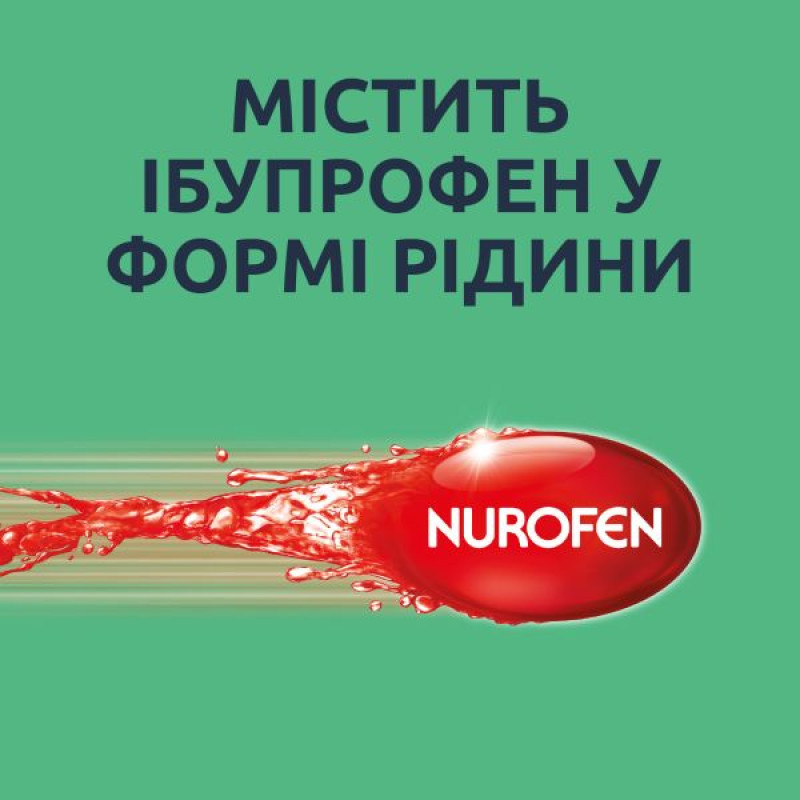Nurofen Express Forte 400 mg capsules No. 20

Instructions for Nurofen Express Forte 400 mg capsules No. 20
Composition
active ingredient: ibuprofen.
1 soft capsule contains 400 mg of ibuprofen;
excipients: macrogol 600, potassium hydroxide, purified water, gelatin, sorbitol solution partially dehydrated (E 420), Ponceau 4R (E 124), ink for printing on the capsule Opacod WB white NS-78-18011.
Dosage form
Soft capsules.
Main physicochemical properties: red oval transparent soft gelatin capsules with the identifying inscription NUROFEN printed in white ink.
Pharmacotherapeutic group
Nonsteroidal anti-inflammatory and antirheumatic drugs. Propionic acid derivatives.
ATX code M01A E01.
Pharmacological properties
Pharmacodynamics
Ibuprofen is a nonsteroidal anti-inflammatory drug (NSAID), a propionic acid derivative, which has demonstrated its effectiveness in inhibiting the synthesis of prostaglandins - mediators of pain and inflammation. Ibuprofen has analgesic, antipyretic and anti-inflammatory effects. In addition, ibuprofen reversibly inhibits platelet aggregation.
Experimental data suggest that ibuprofen may competitively inhibit the effect of low-dose acetylsalicylic acid on platelet aggregation when these drugs are used concomitantly. Some pharmacodynamic studies have shown that single doses of ibuprofen 400 mg administered within 8 hours before or within 30 minutes after immediate-release acetylsalicylic acid (81 mg) have been shown to reduce the effect of acetylsalicylic acid (aspirin) on thromboxane formation or platelet aggregation. Although there is uncertainty about the extrapolation of these data to the clinical situation, it cannot be excluded that regular long-term use of ibuprofen may reduce the cardioprotective effect of low-dose acetylsalicylic acid. Such a clinically significant effect is considered unlikely with non-systematic use of ibuprofen.
Inside the Nurofen® Express Forte capsule, ibuprofen is dissolved in a hydrophilic solvent. After oral administration, the gelatin capsule disintegrates under the action of gastric juice, releasing the already dissolved ibuprofen.
Pharmacokinetics
When taken orally, ibuprofen is rapidly absorbed, partially in the stomach and then completely in the small intestine.
After metabolism in the liver (hydroxylation, carboxylation, conjugation), pharmacologically inactive metabolites are completely excreted mainly in the urine (90%), as well as in the bile. The half-life in healthy volunteers, as well as in patients with liver and kidney diseases, is 1.8 - 3.5 hours. Binding to plasma proteins is approximately 99%. With oral administration of the usual release dosage form, the maximum plasma concentration is reached after 1 - 2 hours. In a pharmacokinetic study, the time to peak plasma levels (Tmax) in the fasting state for the tablet dosage form was 90 minutes, while for Nurofen® Express Forte, soft capsules – 40 minutes. Ibuprofen is detected in plasma for more than 8 hours after taking Nurofen® Express Forte, soft capsules.
Indication
Symptomatic treatment of mild to moderate pain of various origins (headache, toothache, painful menstruation), including colds and fever.
Contraindication
Hypersensitivity to ibuprofen or to any of the components of the drug. Hypersensitivity reactions (e.g. bronchial asthma, rhinitis, angioedema or urticaria) previously observed after taking ibuprofen, acetylsalicylic acid (aspirin) or other NSAIDs. Gastric ulcer/bleeding in active form or recurrent in history (two or more severe episodes of ulceration or bleeding). Gastrointestinal bleeding or perforation associated with the use of NSAIDs in history. Severe hepatic impairment, severe renal impairment, severe heart failure (class IV according to the NYHA (New York Heart Association) classification). Last trimester of pregnancy. Cerebrovascular or other bleeding in the active phase. Hemorrhagic diathesis or blood clotting disorders. Hematopoietic disorders of unknown etiology. Severe dehydration (caused by vomiting, diarrhea, or insufficient fluid intake). Patient weight less than 40 kg or patient age less than 12 years.
Interaction with other medicinal products and other types of interactions
Ibuprofen, like other NSAIDs, should not be used in combination with: acetylsalicylic acid (aspirin), as this increases the risk of adverse reactions, except when aspirin (dose not exceeding 75 mg per day) has been prescribed by a doctor.
Other NSAIDs, including selective cyclooxygenase-2 inhibitors: the simultaneous use of several NSAIDs may increase the risk of gastrointestinal ulcers and bleeding due to a synergistic effect. Therefore, the concomitant use of ibuprofen with other NSAIDs should be avoided.
Ibuprofen should be used with caution in combination with the following drugs:
Anticoagulants: NSAIDs may enhance the effect of anticoagulants such as warfarin;
Antihypertensives (ACE inhibitors and angiotensin II antagonists) and diuretics: NSAIDs may reduce the effect of diuretics and other antihypertensive drugs. In some patients with impaired renal function (e.g. dehydrated patients or elderly patients with compromised renal function), the concomitant use of an ACE inhibitor or angiotensin II antagonist and drugs that inhibit cyclooxygenase may lead to further deterioration of renal function, including possible acute renal failure, which is usually reversible. Therefore, such combinations should be prescribed with caution, especially in elderly patients. If long-term treatment is necessary, the patient should be adequately hydrated and consideration should be given to monitoring renal function at the beginning of the combination treatment and periodically thereafter. Diuretics may increase the risk of nephrotoxic effects of NSAIDs.
Concomitant use of ibuprofen and potassium-sparing diuretics may lead to hyperkalemia (serum potassium monitoring is recommended);
corticosteroids: increased risk of ulcers and bleeding in the gastrointestinal tract;
Antiplatelet agents and selective serotonin reuptake inhibitors: the risk of gastrointestinal bleeding may increase;
cardiac glycosides: NSAIDs can exacerbate cardiac dysfunction, reduce glomerular filtration function of the kidneys, and increase the level of glycosides in blood plasma;
Lithium: there is evidence of a potential increase in plasma lithium levels;
Phenytoin: simultaneous use with phenytoin drugs may increase its serum level;
Methotrexate: use of ibuprofen within 24 hours before or after administration of methotrexate may lead to increased concentrations of methotrexate and increased toxicity;
cyclosporine: increased risk of nephrotoxicity;
Mifepristone: NSAIDs should not be used earlier than 8-12 days after mifepristone administration, as they may reduce its effectiveness;
Tacrolimus: possible increased risk of nephrotoxicity with simultaneous use of NSAIDs and tacrolimus;
Zidovudine: There is an increased risk of haematological toxicity when zidovudine is used concomitantly with NSAIDs. There is evidence of an increased risk of haemarthrosis and haematoma in HIV-infected patients with haemophilia when zidovudine is used concomitantly with ibuprofen.
quinolone antibiotics: simultaneous administration with ibuprofen may increase the risk of seizures;
Sulfonylurea: with concomitant use, it is recommended to check blood glucose values as a precautionary measure;
probenecid and sulfinpyrazone: may delay the excretion of ibuprofen;
CYP2C9 inhibitors: Concomitant use of ibuprofen with CYP2C9 inhibitors may increase the exposure of ibuprofen (a CYP2C9 substrate). A study with voriconazole and fluconazole (CYP2C9 inhibitors) has shown an increase in exposure of S (+)-ibuprofen by approximately 80-100%. A reduction in the ibuprofen dose should be considered when potent CYP2C9 inhibitors are used concomitantly, especially when high doses of ibuprofen are used with voriconazole or fluconazole.
Application features
The side effects of ibuprofen and the entire group of NSAIDs in general can be reduced by using the minimum effective dose necessary to treat symptoms for the shortest period of time.
Caution should be exercised when treating patients:
with systemic lupus erythematosus and mixed connective tissue disease - increased risk of aseptic meningitis (see section "Adverse reactions");
with congenital disorders of porphyrin metabolism (e.g. acute intermittent porphyria) (see section "Adverse reactions");
with diseases of the gastrointestinal tract and chronic inflammatory bowel diseases (ulcerative colitis, Crohn's disease) (see section "Adverse reactions");
with arterial hypertension and/or heart failure (see sections "Contraindications" and "Adverse reactions")
with impaired renal function, as renal function may deteriorate (see sections "Contraindications" and "Adverse reactions");
with impaired liver function (see sections "Contraindications" and "Adverse reactions");
Elderly patients have an increased incidence of adverse reactions to NSAIDs, especially gastrointestinal bleeding and perforation, which can be fatal.
Effects on the respiratory system
Bronchospasm may occur in patients who suffer from bronchial asthma or allergic diseases or have a history of these diseases.
Other NSAIDs
Concomitant use of ibuprofen with other NSAIDs, including selective cyclooxygenase-2 inhibitors, increases the risk of adverse reactions and should be avoided.
Systemic lupus erythematosus and mixed connective tissue diseases
Ibuprofen should be used with caution in cases of systemic lupus erythematosus and mixed connective tissue diseases due to the increased risk of aseptic meningitis.
Porphyrin metabolism
Caution should be exercised in patients with congenital disorders of porphyrin metabolism (e.g. acute intermittent porphyria).
Effects on the cardiovascular and cerebrovascular systems
Patients with a history of hypertension and/or heart failure should start treatment with caution (consultation with a doctor is necessary), since cases of fluid retention, hypertension and edema have been reported with ibuprofen therapy, as with other NSAIDs.
Clinical trial data and epidemiological data suggest that the use of ibuprofen, especially at high doses (2400 mg/day), may be associated with a slightly increased risk of arterial thrombotic events (e.g. myocardial infarction or stroke). Overall, epidemiological studies do not suggest that low-dose ibuprofen (e.g. ≤ 1200 mg/day) may lead to an increased risk of arterial thrombotic events.
Patients with uncontrolled hypertension, congestive heart failure (NYHA class II-III), established ischemic heart disease, peripheral arterial disease and/or cerebrovascular disease should be treated with ibuprofen only after careful clinical assessment. High doses (2400 mg/day) should be avoided.
The clinical picture should also be carefully assessed before starting long-term treatment in patients with risk factors for cardiovascular complications (e.g. hypertension, hyperlipidemia, diabetes mellitus, smoking), especially if high doses of ibuprofen (2400 mg per day) are required.
Effects on the kidneys
Ibuprofen should be used with caution in patients with renal impairment, as renal function may deteriorate.
Effect on the liver
Liver dysfunction is possible.
Surgical interventions
Caution should be exercised immediately after major surgery.
Impact on fertility in women
There is limited evidence that long-term use of cyclooxygenase/prostaglandin synthesis inhibitors (>2400 mg/day and >10 days of treatment) may impair female fertility by affecting ovulation. This is reversible after discontinuation of treatment.
Effects on the gastrointestinal system
NSAIDs should be used with caution in patients with a history of gastrointestinal disease (ulcerative colitis, Crohn's disease) as these conditions may be exacerbated. Gastrointestinal bleeding, perforation, and ulceration, which may be fatal, have been reported at any stage of NSAID treatment, regardless of the presence of warning symptoms or a history of severe gastrointestinal disorders.
The risk of gastrointestinal bleeding, perforation, and ulceration increases with increasing doses of NSAIDs, in patients with a history of ulcer, especially complicated by bleeding or perforation, and in elderly patients. Such patients should start treatment with minimal doses. For such patients, as well as for those who require concomitant use of low-dose acetylsalicylic acid or other drugs that may increase the risk for the gastrointestinal tract, the need for combination therapy with protective drugs (e.g. misoprostol or proton pump inhibitors) should be considered.
Patients with a history of gastrointestinal disorders, especially elderly patients, should be informed of any unusual gastrointestinal symptoms (especially gastrointestinal bleeding), particularly at the beginning of treatment.
Caution should be exercised when treating patients receiving concomitant medications that may increase the risk of ulceration or bleeding, such as oral corticosteroids, anticoagulants (e.g. warfarin), selective serotonin reuptake inhibitors, or antiplatelet agents (e.g. aspirin).
In the event of gastrointestinal bleeding or ulceration in patients receiving ibuprofen, treatment should be discontinued immediately.
Effects on the skin
In exceptional cases, chickenpox can cause severe skin and soft tissue infections. At this time, the effect of NSAIDs on the worsening of these infections cannot be excluded, therefore it is recommended to avoid the use of ibuprofen in case of chickenpox.
Allergy
Caution should be exercised in patients with known allergic reactions to other substances, as these patients are also at increased risk of developing hypersensitivity reactions when using ibuprofen.
Patients suffering from hay fever, nasal polyps, chronic obstructive airways disease, or a history of allergic diseases are at increased risk of allergic reactions, which may manifest as asthma attacks (so-called analgesic asthma), angioedema, or urticaria.
This medicinal product contains sorbitol. If you have been told by your doctor that you have an intolerance to some sugars, contact your doctor before taking this medicinal product.
This medicine contains Ponceau 4R (E124), which may cause allergic reactions.
NSAIDs can mask symptoms of infection and fever.
Other
Severe acute hypersensitivity reactions (e.g. anaphylactic shock) have been observed very rarely. At the first signs of a hypersensitivity reaction after the use of Nurofen® Express Forte, therapy should be discontinued. In such cases, both symptomatic and specialized therapy should be carried out.
Ibuprofen may temporarily inhibit platelet function (affect platelet aggregation). Therefore, it is recommended to carefully monitor the condition of patients with blood clotting disorders.
With long-term use of Nurofen® Express Forte, it is necessary to regularly check liver and kidney function indicators, as well as check the blood picture.
Long-term use of any painkiller for headache may worsen this condition. If this condition is suspected or confirmed, consult a doctor and discontinue treatment. A diagnosis of medication overuse headache should be considered in patients who suffer from frequent or daily headaches despite (or because of) regular use of headache medications.
Habitual use of analgesic drugs, especially combinations of several analgesics, may lead to persistent renal impairment with the risk of renal failure (analgesic nephropathy). This risk may be increased by salt loss and dehydration.
When using NSAIDs while drinking alcohol, the risk of adverse effects related to the active substance may increase, especially from the gastrointestinal tract or CNS (central nervous system).
There is a risk of kidney dysfunction in adolescents with dehydration.
Ability to influence reaction speed when driving vehicles or other mechanisms
Patients who experience dizziness, drowsiness or visual disturbances while taking ibuprofen should avoid driving or operating machinery. Single administration or short-term use of ibuprofen usually does not require any special precautions. This mainly applies to the simultaneous use of the drug with alcohol.
When used in accordance with the recommended doses and duration of treatment, the drug does not affect the reaction speed when driving or working with other mechanisms.
Use during pregnancy or breastfeeding
Inhibition of prostaglandin synthesis may adversely affect pregnancy and/or embryonal/fetal development. Epidemiological data suggest an increased risk of miscarriage, congenital heart defects and gastroschisis following exposure to prostaglandin synthesis inhibitors in early pregnancy. The absolute risk of cardiovascular malformations increased from 1% to approximately 1.5%. The risk is believed to increase with increasing dose and duration of therapy.
NSAIDs should not be taken during the first two trimesters of pregnancy unless, in the opinion of the physician, the potential benefit to the patient outweighs the potential risk to the fetus. If ibuprofen is used by a woman attempting to conceive, or during the first and second trimesters of pregnancy, the lowest possible dose should be used for the shortest possible period of time.
During the third trimester of pregnancy, all prostaglandin synthesis inhibitors may pose the following risks:
for the fetus: cardiopulmonary toxicity (characterized by premature closure of the ductus arteriosus and pulmonary hypertension); renal dysfunction, which may progress to renal failure, accompanied by oligohydramnios; for the mother and newborn, at the end of pregnancy: possible increase in bleeding time, antiplatelet effect, which may develop even at very low doses; inhibition of uterine contractions, leading to delay or prolongation of labor. Therefore, ibuprofen is contraindicated during the third trimester of pregnancy.
In limited studies, ibuprofen has been found in breast milk at very low concentrations, so it is unlikely that it would have any adverse effects on a breastfed infant. NSAIDs are not recommended during breastfeeding.
The use of ibuprofen may affect female fertility. This effect is reversible upon discontinuation of treatment. Therefore, the use of ibuprofen is not recommended in women who have difficulty conceiving.
Method of administration and doses
For oral use in adults and children aged 12 years and over with a body weight > 40 kg. For short-term use only. Undesirable effects can be minimized by using the lowest effective dose for the shortest period of time necessary to control symptoms.
Capsules should be taken preferably during or after meals, without chewing and with water.
The single dose for children aged 12 years and over with a body weight of > 40 kg and adults is 1 capsule (400 mg ibuprofen). If necessary, 1 capsule can be used every 6 hours. The maximum daily dose is 1200 mg (3 capsules per day). Use the minimum effective dose necessary to treat symptoms for the shortest possible period of time.
If symptoms of the disease worsen in adolescents or persist for more than 3 days, it is necessary to consult a doctor to clarify the diagnosis and adjust the treatment regimen.
If in adults the elevated body temperature persists for more than 3 days or the pain does not go away within 4 days, or the symptoms of the disease worsen, it is necessary to consult a doctor to clarify the diagnosis and adjust the treatment regimen.
The duration of treatment is determined by the doctor individually, depending on the course of the disease and the patient's condition.
Elderly patients do not require special dose adjustment, except in cases of severe renal or hepatic insufficiency. Due to the possibility of developing undesirable effects, elderly patients require careful observation.
Patients with mild to moderate renal impairment do not require a dose reduction compared to patients with severe renal impairment (see section 4.4).
No dose reduction is required for patients with mild or moderate hepatic impairment (see section 4.4).
Children
Do not use in children under 12 years of age and children weighing < 40 kg.
Overdose
The use of the drug in children in doses exceeding 400 mg/kg may cause symptoms of intoxication. In adults, the dose effect is less pronounced. The half-life in overdose is 1.5 - 3 hours.
Symptoms. Most patients who have taken clinically significant amounts of NSAIDs have experienced only nausea, vomiting, epigastric pain or, very rarely, diarrhoea. Tinnitus, headache and gastrointestinal bleeding may also occur. In more severe poisoning, toxic effects on the central nervous system may occur, manifested as vertigo, drowsiness, sometimes agitation and disorientation or coma. Sometimes patients experience convulsions. In severe poisoning, hyperkalaemia and metabolic acidosis may develop, and an increase in prothrombin time/prothrombin index may be observed, possibly due to effects on circulating clotting factors. Acute renal failure, liver damage, hypotension, respiratory failure and cyanosis may develop. In patients with bronchial asthma, exacerbation of the disease is possible.
Treatment. Treatment should be symptomatic and supportive, and include maintaining a patent airway and monitoring cardiac and vital signs until the condition returns to normal. Oral administration of activated charcoal or gastric lavage is recommended within 1 hour of ingestion of a potentially toxic dose. If ibuprofen has already been absorbed, alkaline agents may be administered to accelerate the excretion of acidic ibuprofen in the urine. Intravenous diazepam or lorazepam should be used for frequent or prolonged seizures. Bronchodilators should be used for the treatment of acute asthma.
There is no specific antidote.
Adverse reactions
The list of adverse reactions observed after treatment with ibuprofen includes all adverse reactions known during short-term use, as well as those observed during long-term therapy with high doses in patients with rheumatism. The frequency mentioned, which goes beyond very rare reports, refers to short-term use of doses (maximum 1200 mg ibuprofen per day) for oral dosage forms and maximum 1800 mg per day for suppositories.
The development of adverse reactions to the drug mainly depends on the dose and individual characteristics of the body.
Clinical studies show that the use of ibuprofen, especially at high doses (2400 mg per day), slightly increases the risk of arterial thrombotic events (e.g. myocardial infarction or stroke)
Hypersensitivity reactions have been reported and may manifest as:
non-specific allergic reactions and anaphylaxis; airway reactivity such as asthma, asthma exacerbation, bronchospasm, dyspnoea; various skin reactions such as pruritus, urticaria, angioedema, less commonly exfoliative and bullous dermatoses (including epidermal necrolysis and erythema multiforme).
The patient should immediately stop taking the drug in case of any of the above manifestations and inform the doctor.
Adverse reactions that have occurred with ibuprofen are listed by system organ class and frequency. The frequency of adverse reactions is defined as follows: very common (≥ 1/10), common (≥ 1/100 to < 1/10), uncommon (≥ 1/1,000 to < 1/100), rare (≥ 1/10,000 to < 1/1,000), very rare (< 1/10,000) and not known (cannot be estimated from the available data). Within each frequency grouping, adverse reactions are presented in order of decreasing seriousness.
Infections and parasitic diseases
Very rare: exacerbation of inflammation associated with infection.
If signs of infection develop or worsen during use of the drug, the patient is advised to consult a doctor immediately. It is necessary to determine whether anti-infective/antibacterial therapy is indicated.
Symptoms of aseptic meningitis with stiff neck, headache, nausea, vomiting, fever or confusion have been observed with ibuprofen in patients with autoimmune diseases such as systemic lupus erythematosus and mixed connective tissue disease.
Blood and lymphatic system disorders
Very rare: haematopoietic disorders (anaemia, leukopenia, thrombocytopenia, pancytopenia, agranulocytosis). The first signs are fever, sore throat, superficial mouth ulcers, flu-like symptoms, severe exhaustion, unexplained bleeding and bruising.
In this case, the patient should be advised to stop using this medicine and consult a doctor.
During long-term therapy, blood counts should be checked regularly.
On the part of the immune system
Uncommon: hypersensitivity reactions including urticaria and pruritus;
Very rare: severe hypersensitivity reactions, symptoms of which may include swelling of the face, tongue and larynx, shortness of breath, tachycardia, hypotension, anaphylactic reactions, angioedema or severe shock; exacerbation of asthma, bronchospasm.
From the psyche
Very rare: psychotic reactions, depression.
From the nervous system
Uncommon: headache, dizziness, insomnia, anxiety, irritability or fatigue.
From the organs of vision
Uncommon: visual disturbances.
Hearing and balance disorders
Rare: tinnitus, hearing loss.
From the side of the cardiovascular system
Very rare: palpitations, heart failure and myocardial infarction.
From the vascular system
Very rare: arterial hypertension, vasculitis;
frequency unknown: edema
From the digestive tract
Common: dyspepsia, heartburn, abdominal pain, nausea, vomiting, flatulence, diarrhea, constipation and minor blood loss from the gastrointestinal tract, which may cause anemia in exceptional cases;
infrequently: peptic ulcer, perforation or gastrointestinal bleeding, ulcerative stomatitis, exacerbation of colitis and Crohn's disease, gastritis;
very rare: esophagitis, pancreatitis, formation of intestinal diaphragmatic strictures.
The patient should immediately stop using the drug and consult a doctor if upper abdominal pain, melena, or bloody vomiting occurs.
Liver
Very rare: liver dysfunction, liver damage, especially with prolonged therapy, liver failure, acute hepatitis.
Skin and subcutaneous tissue disorders
Uncommon: various skin rashes;
very rare: severe forms of skin reactions such as bullous reactions, including Stevens-Johnson syndrome and toxic epidermal necrolysis (Lyell's syndrome), alopecia.
In some cases, chickenpox can be a source of serious skin and soft tissue infections;
frequency unknown: rash accompanied by eosinophilia and systemic symptoms (DRESS syndrome).
Renal and urinary disorders
Rare: acute renal failure, papillonecrosis, especially with prolonged use, associated with increased serum urea levels;
Very rare: edema, especially in patients with arterial hypertension or renal insufficiency, nephrotic syndrome, interstitial nephritis, which may be accompanied by acute renal failure. Therefore, renal function should be checked regularly.
Laboratory studies
Rare: decreased hemoglobin level.
Expiration date
3 years.
Storage conditions
Store in the original packaging at a temperature not exceeding 25 °C.
Keep out of reach of children.
Packaging
10 capsules in a blister, 2 blisters in a cardboard box.
Vacation category
Without a prescription.
Producer
Location of the manufacturer and its business address
Nottingham site, Thane Road, Nottingham, NG90 2DB, United Kingdom.
There are no reviews for this product.
There are no reviews for this product, be the first to leave your review.
No questions about this product, be the first and ask your question.






















